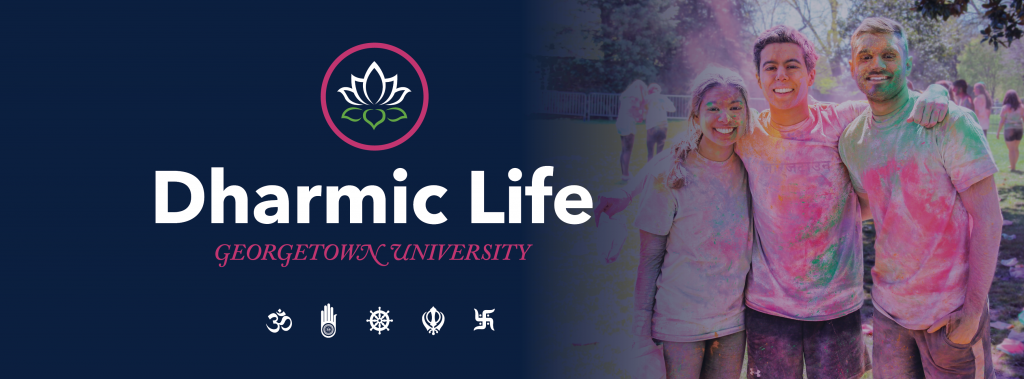Campus Ministry announces the creation of Dharmic Life program

The new Dharmic Life logo incorporates the symbols from Vedic-origin Dharma traditions as well as Jain, Buddha and Sikh Dharmas.
In a step towards better recognizing the spiritual traditions of ancient India and freeing them from outdated terminology and generalizations, Campus Ministry’s Hindu Life program will be incorporated into a new program, Dharmic Life.
When the British came to India, it was mistakenly presumed that non-Muslim people of India – Hindus – practiced one mysterious religion, and thus ‘Hindu-ism’ was reported to be the religion they followed. In fact, there are five major religious traditions – namely Śaiva, Śākta, Vaiṣṇava and Smārta Dharmas in addition to Modern Hinduism and other regional Dharmas. Beyond these Vedic-origin Dharma traditions, there are also the world-famous Jain, Buddha and Sikh Dharmas.
Georgetown University has seen numbers of students hailing from these Dharmic backgrounds increase over the past few years. In consultation with the student groups seeking more inclusive representation and resourcing, Campus Ministry has agreed to create the Dharmic Life program.
Brahmachari Sharan, the director of what was Hindu Life, welcomes the change. “Our Hoyas have a long history of engaging in important dialogue about issues of faith and identity with each other and university leaders. It was the perfect time to make the change – our Hindu students are more aware of their Dharmic heritages, Buddhist students needed more representation, and Sikh Students have recently been able to establish their own student group.”
“Because of this,” Dr. Sharan said, “it made sense to have one Dharmic Life, under which there would be a Hindu spiritual advisor and spiritual advisors of other Dharmic traditions in the future.”
Reflecting on the future of Dharmic Life, Dr. Sharan said, “In bringing Dharmic Life to Georgetown, what we are trying to do is to give people access to the traditions in an authentic manner without any external accretions. Our Dharmic traditions welcome people from all genders, orientations, races, abilities, nationalities, languages, socio-economic groups and religions without discrimination. None of our traditions proselytizes, and as such, anybody who is interested in reading up about Dharmic philosophies or is interested in their practices now has an authentic means of finding out about them.”
For more information about programs and retreats, follow us on Facebook or check out our webpage.